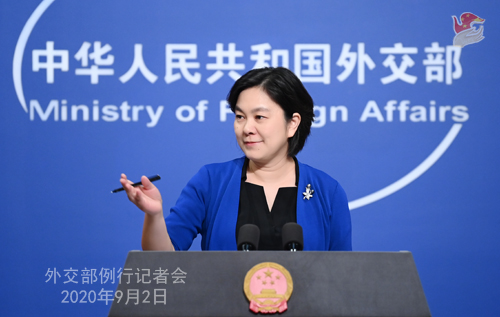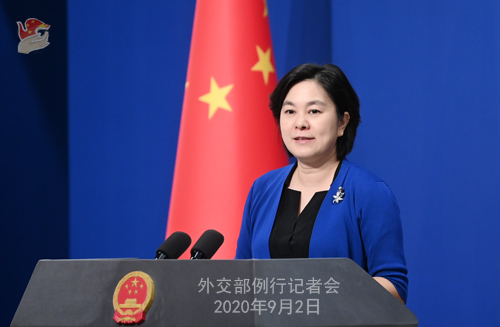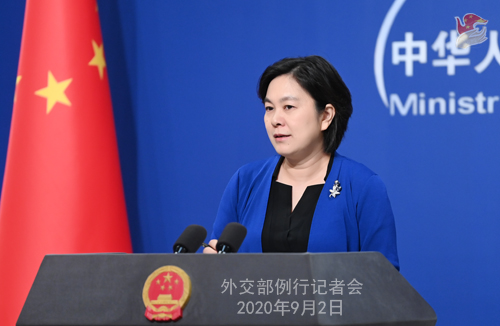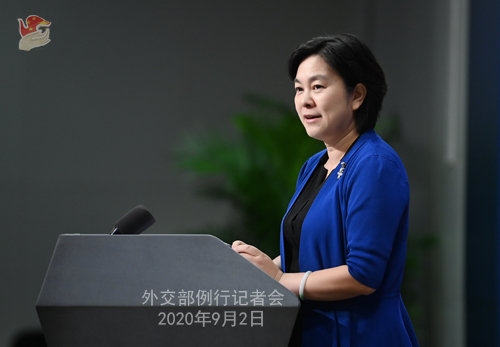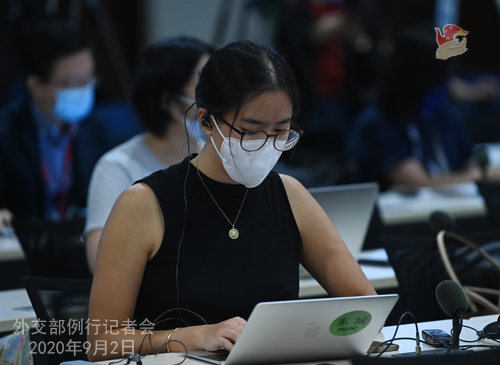| Foreign Ministry Spokesperson Hua Chunying's Regular Press Conference on September 2, 2020 |
| 2020-09-02 23:25 |
|
Invited by Foreign Minister Faisal bin Farhan Al Saud of Saudi Arabia, currently the president of the G20, State Councilor and Foreign Minister Wang Yi will attend the G20 Extraordinary Foreign Ministers Meeting via videolink on September 3 in Beijing. Items to be discussed include cross-border flows of personnel and border management. CCTV: The US House Select Subcommittee on Coronavirus Crisis released reports obtained from the White House task force, which indicate what the administration's officials told the public are in contradiction with those reports they privately issued to states. They have been deliberately covering up the truth of the pandemic. As a result, more than 58,000 additional Americans have died since June and millions of American lives have been put at risk. The US Centers for Disease Control and Prevention found in a survey that among medical workers, roughly 1 in 20 had antibody evidence of a previous COVID-19 infection, but 69% of those infections had never been diagnosed. More and more people believe that in terms of epidemic response, the US stands in stark contrast with China. Do you have any comment? Hua Chunying: I have no intention of judging the US response to COVID-19, but I recall what Dr. Fauci said, "Numbers don't lie." Yesterday, CCTV broadcast an unusual, touching program "First Class of the New Semester", during which first-hand experience was shared by frontline medical experts and researchers including Dr. Zhong Nanshan, head of the high-level expert group of the National Health Commission, who was awarded the Medal of the Republic, and Zhang Boli, Zhang Dingyu and Chen Wei, who were awarded the national honorary title of "the People's Hero". The TV program had three sections: unity, science and responsibility. These three keywords, I believe, offer a good answer to why China is able to snatch a major strategic victory over the epidemic. As Dr. Zhong Nanshan said, after the outbound traffic from Wuhan was halted on January 23, this heroic city endured 76 days and 1,814 hours of lockdown. Thanks to such efforts, the number of infections in China has been reduced by at least 700,000. This is what our country believes in: nothing is more precious than life. Human life is the most important human right. We have saved so many lives, and this best manifests our human right. The CPC and the Chinese government have been putting the people front and center in the epidemic prevention and control endeavor. We have not only protected the safety and health of the Chinese people to the largest extent, but also made important contributions to the global fight against COVID-19 and the protection of life and health of people in the world. On January 23, outbound traffic from Wuhan was suspended. Back then there was only one confirmed case in the US. On January 31, American airlines suspended direct flights between the US and China. On February 2, the US closed borders to all Chinese citizens when there were only more than 10 confirmed cases reported in the US. The timeline is clear. After China blocked the outbound transmission routes of the epidemic, why did the situation in the US see dramatic changes within just a few months? This is a question that deserves careful pondering and in-depth inquiry. We sympathize with the American people for their difficult situation. We hope they can overcome the epidemics at an early date.
Macau Monthly: We noticed that State Councilor and Foreign Minister Wang Yi just concluded his visits to Italy, the Netherlands, Norway, France and Germany, which is seen by some media as China's engagement with Europe to break out of a diplomatic encirclement. I wonder what is your comment? Hua Chunying: What you said is not accurate. To be precise, this is very important strategic communication between China and European countries when there are increasing uncertainties in the international landscape. The world now must choose between multilateralism and unilateralism, openness and isolation, and cooperation and confrontation. This is where China and Europe share broad and essential consensus. During the visit, State Councilor Wang Yi had candid, in-depth discussions with leaders and foreign ministers of the five countries. All the five countries said they attach high importance to their relations with China, that they would like to resume exchange and cooperation with China as soon as possible, and that they are ready to enhance communication and coordination with China and handle global challenges together. They also expressed concerns of the world economy falling into deep recession due to the spreading pandemic, rising unilateralism that gravely undermines multilateralism, and escalated international competition and confrontation caused by artificial decoupling and division. The two sides reached the following three important consensuses. First, to stay committed to multilateralism and oppose unilateral practices. The strongest call of the five European countries is to firmly uphold multilateralism. They believe China and Europe need to enhance coordination, stick to multilateralism, take multilateral actions, observe multilateral agreements and strengthen multilateral institutions. Second, to strengthen solidarity and cooperation and reject division and decoupling. Both sides agree to further cooperate in fighting the epidemics and resume people-to-people exchange and practical cooperation as soon as possible, which will be a China-Europe contribution to world economic recovery and growth. Both sides also agree to jointly reject the setbacks of instigation, division, decoupling and confrontation, so that the world will not be subject to the law of the jungle again. Third, to uphold the big picture of China-Europe relations and properly manage differences. Both sides believe it is important to stick to the comprehensive strategic partnership and lead the mainstream effort to advance China-Europe relations. To resolve differences between the two sides, we must deepen mutual understanding and trust through equal-footed dialogue and candid discussion, achieve win-win results through mutually beneficial cooperation, and manage the differences through constructive means. This year marks the 45th anniversary of the establishment of diplomatic ties between China and the EU. Both sides share a strong will to work together to further advance bilateral relations. In the next phase we have the following six goals. First, to prepare for and conduct China-EU high-level exchange, which will guide bilateral cooperation. Second, to conclude the negotiations on a China-EU investment agreement within this year. Third, to sign the China-EU 2025 Strategic Agenda for Cooperation as early as possible. Fourth, to foster a green partnership. Fifth, to strengthen digital economic cooperation. Sixth, to enhance support for multilateral institutions. As proven by facts, the development of China-EU relations not only brings great benefits to the two peoples, but also contributes greatly to world peace, stability and development. China is ready to continue working with the European side to advance bilateral ties and uphold multilateralism, free trade and world peace and stability. CRI: It is reported that on August 31, the Sudanese transitional government and the Sudan Revolutionary Front (SRF) which groups the armed opposition parties signed a peace agreement in Juba, capital of South Sudan, marking significant progress in the Sudan's domestic peace process. What is China's comment? Hua Chunying: As a friendly country to Sudan, China welcomes and supports the signing of the peace agreement between the transitional government of Sudan and relevant parties in Sudan. China is ready to work with the international community to continue making constructive efforts in promoting peace, stability and development of Sudan.
ITV: ITV news has spoken to a doctor in Turkey who says that she was part of a population control plan run by the Communist Party in Xinjiang. Have Uyghur women there been sterilized and forced to have abortions and does that explain the drop in population among that ethnic community? Some American media say the US is going to pin the label of "genocide" to how China treats Uyghurs in Xinjiang. What's your comment? Hua Chunying: On Xinjiang, several countries and some people have created so many lies regarding Xinjiang, including those quotations they made. The truth is that they are just actors at someone else's disposal. So whenever you hear that Xinjiang is doing something to its Uyghur population, you should process what you hear through a sieve, eliminating the false and retaining the true. Since you are interested, I can offer you some information. First of all, it must be pointed out that the claim that China is persecuting the Uyghur Muslims in Xinjiang is a false proposition. This is a sensational headline concocted by some anti-China forces, another farce designed to smear and discredit China. There are 56 ethnic groups in China. The Uyghurs are equal members of the big family of the Chinese nation. The Chinese government always protects the legitimate rights and interests of ethnic minorities. China's population policy has long favored ethnic minorities, including the Uyghurs. You mentioned population control. The truth is that the Uyghur population in Xinjiang has continued to grow. In 1978, the population of Uyghurs in Xinjiang was 5.55 million. But according to the latest data, by 2018, it had grown to 12.71 million, more than double the number of 40 years ago. During the 8-year span from 2010 to 2018, the population of the Uyghurs in Xinjiang had a 25% increase of 2.54 million. This increase rate is not only higher than that of the entire Xinjiang population, but also more than ten times of the growth rate of the Han population over the same period. Some media disclosed that the US is considering labeling the situation in Xinjiang as "genocide". I just said that the Uyghur population jumped from 5.55 million to 12.71 million. With such an increase in the Xinjiang Uyghur population, how come it is called "genocide"? On the contrary, the eviction, assimilation and slaughter of American Indians in the US history caused their population to drastically drop from 5 million to 250,000. This is what "genocide" is. I must also point out that most of the materials used by the anti-China forces in some western countries to smear and discredit China's policies on Xinjiang came from Adrian Zenz, a German "scholar". The media has repeatedly disclosed that Adrian Zenz is a key member of the Xinjiang Education and Training Center Research Group set up by the US intelligence agency, making a living from fabricating rumors about Xinjiang and slandering China. He selectively used some data and staged several "actors" to play the role of "witnesses" according to his fabricated "scripts" and "lines". His rumor-mongering and deceitful behavior is contemptible and should be punished by the law. On more facts on the Uyghur population issue, the government of the Xinjiang Autonomous Region held a special press conference. I suggest you watch it carefully. I would also like to stress that in observing and commenting on China's affairs, one should always base their observations on facts, grasp the real situation, and tell the whole truth apart from biased opinions, still less spreading falsehoods and rumors. In the meantime, we welcome those who truly care about Xinjiang to visit Xinjiang and see with their own eyes how ethnic minorities in Xinjiang, like Uyghur, Kazakh and Han people, are living together in harmony. All the rumors will collapse in the face of the truth.
Xinhua News Agency: At a press conference jointly held with State Councilor Wang Yi, German Foreign Minister Heiko Maas said Germany and China stressed the importance of preserving the JCPOA. Separately, a meeting of the JCPOA Joint Commission at the level of political directors was convened in Vienna on September 1. Could you give us more details on the progress between China and the European side on upholding the JCPOA, if any? Hua Chunying: China and the European side have all along been in close communication regarding upholding the JCPOA. As you said, parties including China, Russia, Iran, France, Germany, the UK and the EU recently held this JCPOA Joint Commission meeting. The background of this meeting is that the US wants to hijack the Security Council to take illegal actions against Iran. Principal official of the Department of Arms Control of the Chinese Foreign Ministry led a delegation to the meeting. The meeting sends out an unequivocal message of upholding the JCPOA and the authority of the Security Council. All participants of the meeting stressed that when the US unilaterally announced withdrawal from the JCPOA, it forfeited its right as a JCPOA participant state and with that, the right to call for a snapback of sanctions. All parties reiterated that they would continue discussing the implementation of the deal under the framework of the Joint Commission and welcomed the consensus reached on the safeguards implementation issue between the IAEA and Iran. The Chinese side pointed out at the meeting that the US has reneged on its international legal obligations, unilaterally walked away from the JCPOA, reinstated illegal unilateral sanctions, imposed long-arm jurisdiction against Iran, and spared no effort in obstructing other parties' implementation of the deal. This is the root cause of the tensions in the Iranian nuclear situation. The US illegal attempt at the Security Council has met with extensive opposition and won't succeed. China reiterated its consistent position that all parties should remain committed to resolving differences through dialogue and consultation within the framework of the Joint Commission and called on all parties to support the implementation of the consensus on safeguards implementation issue between the IAEA and Iran. In the meantime, China supports the establishment of an alternative multilateral dialogue platform on the premise of firmly safeguarding the efficacy and authority of the JCPOA on the Iranian nuclear issue, where all parties can forge new consensus on maintaining regional peace and stability. To sum up, China will continue working with other parties to stand on the right side of the history, firmly uphold multilateralism and make relentless efforts to advance the political and diplomatic settlement of the Iranian nuclear issue. NHK: Taiwan media report that the Taiwan authorities will have the "Taiwan" and "Taiwan passport" printed bigger on the new "passport" cover. Does China have any comment? Hua Chunying: No matter what tricks the DPP authorities play, they cannot change the fact that Taiwan is an inalienable part of the Chinese territory.
China Daily: The Philippine presidential spokesperson on September 1 responded to a question on the US sanctioning Chinese companies for activities in the South China Sea. He said that the Philippines is an independent country. President Duterte will not halt infrastructure projects involving Chinese firms blacklisted by the United States and will continue to push forward relevant projects. What is your response? Hua Chunying: China has made clear our position on the US announcement of sanctions on Chinese companies participating in the construction activities in the South China Sea. We noted the remarks made by the spokesperson of the Philippine Presidential Palace. President Duterte has placed economic recovery and people's well-being as the Philippine government's top priority, and has pursued an independent foreign policy based on the national interests of the Philippines, which we commend as it is in line with the fundamental interests of the nation and the people. Practical cooperation between China and the Philippines has always been based on mutual respect and mutual benefit. All the projects are in accordance with the laws and regulations of the two countries. The synergy between the Belt and Road initiative and the Build, Build, Build initiative has yielded positive results and is delivering greater benefits to the two countries and peoples. We are ready to deepen bilateral cooperation with the Philippines. AFP: Do you have any comment on the Pentagon report on China's military power, specifically the claim that China is expected to double its nuclear warheads stockpile over the next decade? Hua Chunying: This latest report is just the same as the previous fact-neglecting and bias-brimming ones. China is firmly opposed to those improper comments on China's national defense and deliberate distortion of China's strategic intentions. China's strategic intentions are transparent and consistent. The Constitution of the People's Republic of China clearly stipulates that China adheres to the path of peaceful development and promotes the building of a community with a shared future for mankind. China has also pursued a national defense policy that is defensive in nature. China is a builder of world peace, a contributor to global development and a defender of international order. The development of China's military power means growing strength for world peace. China's strengthening of national defense is to safeguard national independence, sovereignty and territorial integrity, and is exercising the legitimate rights and interests of a sovereign state, which is beyond reproach. As we all know, China's military power is far behind that of the US. The United States spends as much on its military as nearly the next 10 countries combined. The US is just looking for excuses to seek absolute superiority and hegemony in the military field. We urge the US side to abandon the outdated cold-war mentality and zero-sum game mindset, stop issuing irresponsible reports year after year, take an objective and rational view of China's strategic intentions and national defense building, and do more things that are conducive to China-US and military-to-military relations, rather than the other way around. Shenzhen TV: Indian foreign ministry and defense ministry issued statements saying that "Indian troops pre-empted this PLA activity on the Southern Bank of Pangong Tso Lake, undertook measures to strengthen our positions and thwart Chinese intentions to unilaterally change facts on ground." According to the Indian side, the Chinese soldiers were backed up by military vehicles and drew close enough to engage Indian troops in verbal arguments, but there were no clashes. The Indian side mobilized and occupied the four heights on the Indian side of the LAC. I wonder if you have any response to this? Hua Chunying: The Indian side claims it "pre-empted" some activities. Like the Chinese saying "There are no 300 taels of silver buried here", which means one accidentally gives away the hidden truth in an explanation, India's statements reveal the fact that the Indian troops were the first to have illegally crossed the LAC, made provocations, changed the status quo in the border areas, and violated bilateral agreements and important consensus. Since the beginning of this year, India has breached bilateral agreements and important consensus many times in the western sector of the China-India boundary, attempted to unilaterally change the status quo by force, undermined peace and stability in the border region and caused tensions. The responsibility lies entirely with the Indian side. China has kept maximum restraint to prevent potential escalation. The two sides are in communication through military and diplomatic channels. We urge India to strictly discipline its border troops, stop all provocations at once, immediately withdraw all personnel who illegally trespassed across the LAC, and stop taking any actions that may escalate tensions or complicate matters. We hope India will work with China to implement bilateral agreements and important consensus reached by leaders of the two sides, and make concrete efforts to uphold peace and tranquility in the border areas.
Reuters: The Indian side said that the "Tibetan armed unit" is part and parcel of the Indian armed forces, because they have the best high-altitude combat capabilities. This unit was formed under the guidance of the CIA in the 1960s, which is part of the "strategic exchange" between the two sides. The Dalai Lama and the "Tibetan government-in-exile" support them in fighting shoulder to shoulder with India. What is China's view on "Tibetans in exile" joining the Indian army? Hua Chunying: I'm not aware of what you said about these "Tibetans in exile" in the Indian armed forces. You may ask the Indian side for this. But I noted some words you mentioned, including "the 1960s", "CIA" and "Tibetans in exile". These words prompt us to ponder over the ins and outs of the Tibet-related issues and the role the US has played in this process. China's position is very clear. We firmly oppose any country providing convenience in any form for the "Tibet independence" forces' separatist activities. I am also wondering what is the connection between so-called "Tibetans in exile" and the Indian border troops. I hope you can do some in-depth investigation. It will be great if you can share with us any further information and progress in this regard. Reuters: Has China decided to join the COVAX initiative? If so, how much does China plan to contribute? Does China hope to stabilize domestic vaccine supply by taking part in the project? Hua Chunying: At the 73rd session of the World Health Assembly, President Xi Jinping pledged that COVID-19 vaccine development and deployment in China, when available, will be made a global public good, which will be China's contribution to ensuring vaccine accessibility and affordability in developing countries. This is highly consistent with COVAX's efforts to ensure that all countries have equal access to appropriate, safe and effective COVID-19 vaccines. China supports COVAX and has been in communication with the WHO and other sponsors of the plan. Yesterday, competent Chinese authorities and vaccine companies held a video conference with the WHO, the Global Alliance for Vaccines and Immunization (Gavi), the Vaccine Alliance and the Coalition for Epidemic Preparedness Innovations (CEPI) to further exchange views on relevant issues and agreed once again to jointly advance the global research, development, production and distribution of COVID-19 vaccines. China's vaccine companies strictly follow scientific and regulatory rules, and they have been working tirelessly to advance research and achieved remarkable outcomes. In fact, China is leading the world in this field. Nine of China's vaccine candidates have entered clinical trials, and four of them got the approval to be subject to Phase III of clinical trials in foreign countries. During the R&D process, we attach great importance to safety and effectiveness, and we strictly observe international norms, laws and regulations. China noted the expectations placed by some countries on China with regard to vaccine R&D, manufacturing and distribution. In fact, our cooperation with some countries already began. China always honors commitments. We will continue conducting international cooperation in vaccine R&D, manufacturing and distribution, and we hope other countries that have made progress in this area will join us in enhancing the accessibility and affordability of COVID-19 vaccines. Bloomberg: Can you say definitively if China will or will not join COVAX? And if you cannot say definitively, can you give me some indication as to what is holding China back on that decision? And if the decision is forthcoming, within what time frame could we expect such a decision? Hua Chunying: COVAX is meant to ensure that all countries have fair and equal access to proper, safe and effective vaccines. China has announced that once China succeeds in vaccine R&D and puts them into use, we will make the vaccines a global public good and contribute to vaccine accessibility and affordability in developing countries. Like I said, what China is doing is in essence the same with COVAX. China supports COVAX and has been in communication with WHO and other parties. Yesterday we held a video conference in this regard. China will remain in close communication with WHO and COVAX sponsors.
|
| |||||||||||||||||
